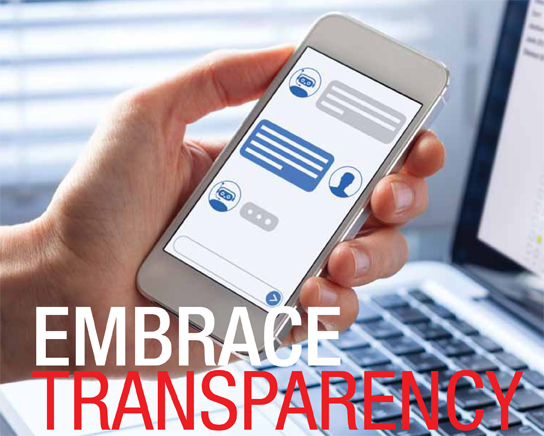Embrace transparency

You can't hide from customers and prospects
By Troy Harrison
I am constantly telling people that selling has changed more in the last 10 years than in the previous 100 years. Sometimes, people ask me what I mean, specifically. I explain that what has changed selling the most is the accessibility of information. Too often, we salespeople tend to look at information as a one-way street; technology has added new tools to get our message out, to prospect, to build relationships, and to research customers.
What we forget is that technology is a two-way street. It also has allowed our customers and prospects to do a better job of researching us. They can check us out. They can check our companies out. And they can check our products out. All without leaving their couch or office chair, if they want to. What’s more, not all of that information is information we can control. Nervous yet?
My selling career started in 1990. At that time, for the most part, I, and my company, controlled the information that was widely disseminated about us. My customers knew about me only that which I felt like telling them. The messages that got out about my company and its products were those that got out through our marketing and advertising. Not shockingly, most of what got out into the marketplace was positive.
What wasn’t positive was spread by the old “word of mouth” method. You know the saying. “Do something good for a customer and they’ll tell one person. Do something bad to them, and they will tell 10.” That’s not ideal, but it’s not disastrous, either. Although the multiplier effect of those 10 was often discussed (and they tell 10, and those people will tell 10, etc.), in practice, you had to be pretty bad at what you did to suffer serious damage to your reputation from customer service failures.
It’s not that way now.
Now, the person who has a positive experience will tell one person. The person who has a bad experience will do their best to tell the entire world, though social media. What that means is that your entire operation, your customer service practices, and your business practices can be laid bare to all of your customers and prospects with just a few clicks. That isn’t necessarily a bad thing unless you have a lot that you’d like to hide. Here are some ways that can happen:
Online Reviews: When we think of reviews, we think of things like Yelp and Tripadvisor. That gives some people a false sense of security; they think that if they are not in the restaurant or hospitality industries, they are immune from reviews. Not so. Virtually any business can be reviewed on Google’s review pages, for instance, which means that if someone Googles your company, whatever people are saying there is visible. What is it saying about you?
A while back, I had occasion to check the reviews of a heavy equipment dealer that sold and rented equipment. The very first review was from a person who had rented a bulldozer from them a few weeks previous. While renting, they broke off a cowl light. They anticipated that they would be billed for fixing it. What they didn’t anticipate was that they would be billed nearly triple what it should have cost; in fact, they called three other dealers to see what replacing the light through their service departments would cost to verify the overbilling. Here’s what is worse. They rented the same dozer again, two weeks later, and the cowl light had not been fixed. So, not only were they overbilled, but the job wasn’t even done. The dealer simply gouged them. That’s out there in the world forever. Do you think that might be affecting their rental business? I do. Moral of the story: check your reviews.
Product specs: Once upon a time, salespeople were the repository of all product information. If a customer wanted to know the specs on a particular product or machine, they could either go through the process of ordering a brochure (meaning calling or writing someone), or they could get a salesperson. It was a great time for salespeople. The only things the customer ended up knowing about their products and services were the things that salespeople told them. As you might imagine, that allowed us a great deal of latitude.
Now, it’s not so. If you try to misquote, or omit, information about your product, your customer can quickly pull it up on their computer or phone and correct you. So, when you quote specs, you’d better get it right or you’ll get called on it.
Your own social media: We like to check customers out on social media, but did you ever think that they would be checking you out? It happens frequently. Whenever I send out a marketing message, I get notifications that my LinkedIn profile is being viewed by many of the same people I just marketed to. I’ve seen the same thing with salespeople who cold call. Even if they don’t accept the appointment, they will check you out. What is your profile saying about you?
Even on a business platform like LinkedIn, I see people taking stands that are controversial, or posting a lot of unprofessional material and content, or even complaining about their company and customers. That is just dumb. If you do that, be aware that you’re going to miss business when (not if) people check you out. And you might have some uncomfortable questions asked of you.
The thing to remember is that, in today’s world, transparency exists to a degree never known in our profession, whether you like it or not. There isn’t much that you can hide from your customers and prospects, so you might as well not even try. Remember: You can either embrace transparency, or have it forced upon you.
 Troy Harrison is the author of “Sell Like You Mean It!”, “The Pocket Sales Manager,” and a speaker, consultant and sales navigator. He helps companies build more profitable and productive sales forces. To schedule a free 45-minute sales strategy review, call (913) 645-3603, email Troy@TroyHarrison.com or visit www.TroyHarrison.com.
Troy Harrison is the author of “Sell Like You Mean It!”, “The Pocket Sales Manager,” and a speaker, consultant and sales navigator. He helps companies build more profitable and productive sales forces. To schedule a free 45-minute sales strategy review, call (913) 645-3603, email Troy@TroyHarrison.com or visit www.TroyHarrison.com.
This article originally appeared in the Jan./Feb. 2020 issue of Industrial Supply magazine. Copyright 2020, Direct Business Media.













